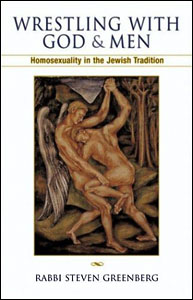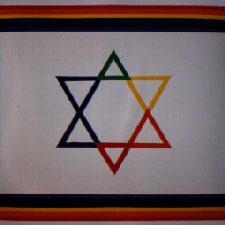 Wrestling with Steve Greenberg
Wrestling with Steve Greenberg
"I believe we are living in an age in which the shechinah is becoming visible," Rabbi Steve Greenberg says. "There are questions we can ask now that we have not been able to ask before."
Greenberg is "the openly gay Orthodox rabbi." That's the way he's referred to in the press, definite article included, and it's a destiny which he did not choose, but which he has come to accept. Featured in Trembling Before G-d, Greenberg joined filmmaker Sandi Simcha Dubowski on a worldwide journey in support of the movie, and is now on book tour for Wrestling with God and Men: Homosexuality in the Jewish Tradition, the most comprehensive treatment of the subject in publishing history. His book, well-researched, well-argued, well-written, may change the lives of thousands of men and women. Greenberg thinks his case is so urgent not just because of humiliation and marginalization within the Jewish "religious" community, not just because of 60,000 gay teenage suicides a year, and not because of basic Jewish values of equality or dignity but because gays and lesbians can help us do Torah better.
Greenberg's book is an apology for so many different ideologies that it's sometimes hard to know where the rabbi himself stands. It is, overtly, a plea for Orthodox Jews to take a more inclusive attitude toward their gay and lesbian members. It is also a plea to queer Jews not to leave Orthodoxy behind, or relegate it to the dust-heap of exclusionary fundamentalisms. Greenberg recognizes and invites Orthodox and Conservative Jews to recognize that "for many gay Jews, it is Judaism, and not homosexuality, that is in question." And so, even as he recognizes the homophobia and intolerance within the Jewish tradition ideologies which existed alongside gay and lesbian Jews, and the ethos of effeminate masculinity so capably documented by Daniel Boyarin, Sander Gilmanand others Greenberg goes about rescuing the halachic process, condemning many of its foremost proponents, but also engaging with them. For example, the brutal homophobia of Rav Moshe Feinstein is raised, acknowledged and then, in a curious way, agreed with. (Rav Moshe, in a vitriolic letter which many readers believe protests a bit too much, said that we should not even enter into a discussion of the homosexuality taboo, because to explore the reasons for it suggests that the taboo might one day, somehow, be lifted. Greenberg agrees, and then explores the reasons.)
Ultimately, Greenberg's thesis is that homosexuality is a form of misogyny, that what Leviticus 18:22 says is "Don't make a woman out of a man." We've mistaken a statement about violence and humiliation that's what's meant by to be made a woman' as a statement about anatomy.
Greenberg's reading is linguistically persuasive, and, ironically, succeeds precisely because it condemns. We've got a much bigger problem here, Greenberg seems to be saying. And only now, only now that gay and lesbian voices can be brought to the table, can we see it clearly. Our lives are "new information" to the halachic process; we are helping Jews to understand Torah better.
 I sat down to interview Steve Greenberg for the Forward
my review
of his book was published on April 30. But I sat down with my own
agenda
and concerns also. I've memorized the citation of Leviticus 18:22. I've written a short story about it, led seminars about it, talked about it with teenagers, adults, queers, straights, Jews, and gentiles. I've analyzed its puzzling grammar and concordance-checked its key words. And I've come to different conclusions from Steve: substantively, and tactically. Our interview became almost a jousting match, albeit one between two allies who both know that, ultimately, our cause is the same, and our enemy fear is the same as well.
I sat down to interview Steve Greenberg for the Forward
my review
of his book was published on April 30. But I sat down with my own
agenda
and concerns also. I've memorized the citation of Leviticus 18:22. I've written a short story about it, led seminars about it, talked about it with teenagers, adults, queers, straights, Jews, and gentiles. I've analyzed its puzzling grammar and concordance-checked its key words. And I've come to different conclusions from Steve: substantively, and tactically. Our interview became almost a jousting match, albeit one between two allies who both know that, ultimately, our cause is the same, and our enemy fear is the same as well.
I read Leviticus 18 as being about idolatry. I think the Hebrew word "toevah" is the key, and I think that word essentially means "taboo." I think the verse is about ritual homosexuality, widely practiced in the Ancient Near East (with cultic prostitutes known as k'deshim and enjoying a minor resurgence today among the Radical Faeries, Body Electric, and other groups in which I myself have participated. Loving sex between two men, and especially two women, is as closely related to the toevah of Leviticus as lighting a campfire is to the "strange fire" of Nadav and Avihu.
More importantly, I see the campaign to end institutionalized Jewish homophobia, which I consider to be a mild form of genocide, as requiring two critical elements. The first of these is a recognition that people are dying. Lives are being mutilated, and suicides are being encouraged by the shamefully ignorant pronouncements of rabbis who should know better. These rabbis, who pretend to be "just trying to understand the meaning of this verse," turn a blind eye to the violent tortures and deaths of the closet, as they prattle about lifestyle choice. I recently read a sermon given by a member of the Conservative Movement's law committee which analogized homosexuality to the choice of getting a tattoo.
The second critical element in our struggle, it seems to me, must be to learn and then teach just what it is that GLBT Jews have to offer. Whether it is a recognition of the disproportionate number of mystics and artists who were, and are, gay, or whether it's a queer-theory grounded appreciation of difference, or whether it's just a simple "gorgeous mosaic" of love, queer Jews need to say to our non-queer Jewish brethren "We're here, we're queer, and we've got a lot to offer."
A smart scholar once said: When a man and a woman walk down the street holding hands, they're saying something about their love. When two men do it, they're saying something about their sex life. This is still how many, and I would wager most, see the struggle for GLBT equality as an impolite, perhaps disgusting, revelation of that which should be kept private. As if wedding rings, marriage benefits, pregnant wives, honeymoons, dating shows, romantic comedies as if all of these are somehow "private" and not heteronorms drilled into our heads every day.



The Hamas Class of 1992
Michael Shurkin
Every City has a Soul
Jill Hammer
Wagner in Israel
Margaret Strother
Wrestling with Steve Greenberg
Jay Michaelson
T Cooper
Abi Cohen
The Stable
Ira Stone
Archive
Our 450 Back Pages
Saddies
David Stromberg
Zeek in Print
New Spring 2004 issue now on sale!
About Zeek
News & Events
Contact Us
Tech Support
Links
From previous issues:
Carrying Light into Dark Times
Rabbi Zalman Schachter-Shalomi
Run Like the Wind
Jay Michaelson and Dan Friedman
Erev
Temima Fruchter